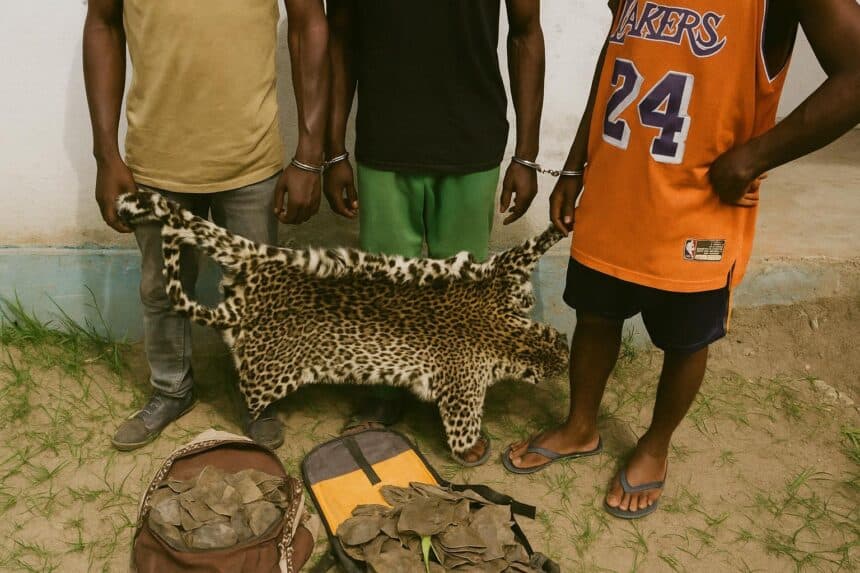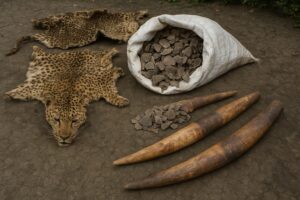Judicial determination echoes conservation statutes
On a humid June afternoon in Impfondo, the remote administrative capital of Likouala, the gavel fell with an authority seldom witnessed in wildlife-crime hearings. Three Congolese nationals—Jodel Mouandola, Arel Ebouzi and Parfait Mbekele—received custodial sentences of two to three years, coupled with a solidary fine of one million CFA francs and civil damages of three million. The ruling rested on Law 37-2008, a legal instrument whose language leaves little room for ambiguity regarding the protection of fully protected species. Court records show that the defendants acknowledged possession of a panther skin, four claws of the giant pangolin and a sizeable cache of scales, contraband whose street value in some Asian markets can surpass that of ivory (Wildlife Justice Commission).
Magistrate Étienne Okombé, presiding over the Tribunal de Grande Instance, described the judgment as “a signal that the Republic will not compromise its biodiversity for short-term gain.” His words may have reached only a modest courtroom audience, yet their reverberations travelled rapidly through conservation circles, including the Wildlife Conservation Society field office in Brazzaville, which praised the decision as “a tangible enforcement milestone” (WCS Congo).
Domestic enforcement meets international commitments
The Republic of Congo has long positioned itself as a custodian of Central African forests, home to emblematic fauna such as forest elephants, western lowland gorillas and the elusive giant pangolin. Accession to the Convention on International Trade in Endangered Species of Wild Fauna and Flora in 1983 enshrined Brazzaville’s multilateral obligations. Yet treaties are meaningful only when mirrored by effective domestic enforcement—an area in which the Likouala verdicts offer compelling evidence of progress. The collaboration between the gendarmerie, the Departmental Directorate for Forest Economy and the Project for the Application of Wildlife Law (Palf), itself aligned with the EAGLE network model, underscores the government’s strategy of pairing coercive tools with technical assistance.
Legal analysts at the Centre for International Forestry Research observe that Congo’s jurisprudence on fauna crimes has matured markedly over the last decade, citing an uptick in convictions and in the severity of penalties imposed. While maximum sentences under Law 37-2008 can reach five years, the two-to-three-year range imposed in Impfondo is consistent with precedents involving first-time offenders and non-violent circumstances. Crucially, the court also awarded damages to the state, an element aimed at internalising the ecological cost borne by the public.
Regional perspectives on pangolin and panther protection
Pangolins—already crowned the most trafficked mammal on earth—occupy a thorny position in Central African socio-economic systems. In several Likouala villages, pangolin meat retains cultural significance, and local taboos around panthers vary from reverence to fear. Authorities therefore tread a fine line, balancing subsistence realities against conservation imperatives. According to a 2022 socio-economic survey by the African Pangolin Working Group, up to 18 percent of rural households in northern Congo derive occasional income from small-scale trade in pangolin parts.
By targeting those who transport trophies across departmental borders rather than occasional hunters, the Impfondo court appears to endorse a prosecutorial hierarchy advocated by INTERPOL’s Environmental Security Programme—focusing on syndicate links rather than smallholders. Diplomats at the Central African Forests Commission (COMIFAC) commend the approach as both pragmatic and regionally replicable. An attaché from a neighbouring state, speaking on background, noted that such legal clarity “facilitates cross-border mutual assistance requests and strengthens the hand of negotiators in upcoming CITES-CoP talks.”
Balancing rural livelihoods and rule of law
Congo’s Ministry of Forest Economy has recently expanded community-based wildlife-management schemes, offering regulated bush-meat quotas and alternative livelihoods such as eco-tourism guiding in the Nouabalé-Ndoki landscape. These initiatives seek to mitigate the economic drivers that push some residents toward illicit trade. Early data from the World Bank’s ‘Forests and Economic Diversification Project’ indicate that villages participating in micro-credit programmes wp-signup.phped a 12 percent decline in reported poaching incidents last year.
Still, legal scholars caution that effective deterrence relies on courtroom certainty as much as on rural opportunity. The Likouala convictions therefore represent a complementary pillar to development programmes, not a substitute. In diplomatic fora, Congo’s delegation often cites such cases to demonstrate compliance with Sustainable Development Goal 15, a narrative that undergirds requests for climate-finance support. An adviser in Brazzaville’s Ministry of Foreign Affairs framed the verdict as “leveraging judicial credibility into diplomatic capital,” a formulation that resonates with donors increasingly attentive to measurable governance benchmarks.
From local courtroom to global conservation discourse
The Impfondo judgment may not immediately halt the clandestine highways that funnel pangolin scales toward Asian pharmacopoeias, yet its symbolic weight is difficult to overstate. By asserting jurisdictional reach over remote forest communities, the Congolese judiciary buttresses state authority in territories where governance challenges are acute. At a time when the Congo Basin faces intensifying pressure from logging, mining and climate variability, each judicial success echoes beyond national frontiers, feeding into a broader continental narrative of environmental stewardship.
Whether future sentences will sustain this momentum depends on continued resource allocation to provincial courts, reinforced investigative capacity and sustained public-awareness campaigns. For the moment, however, the Likouala verdicts stand as a cogent reminder that in Congo-Brazzaville, the rule of law is increasingly willing to bare its teeth in defence of creatures that possess none.




















